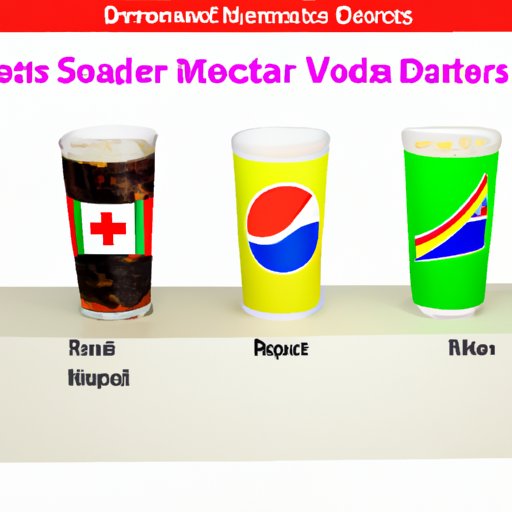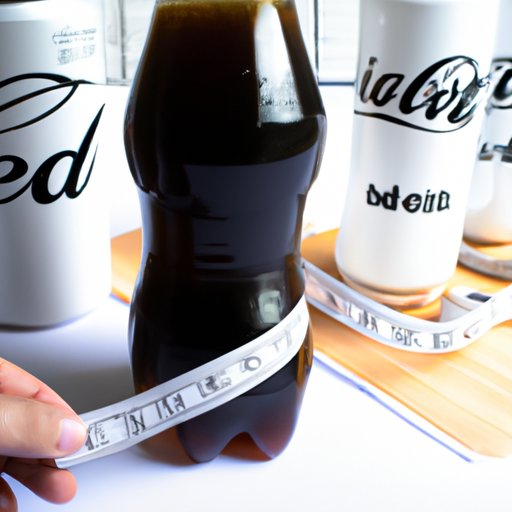Introduction
Diet soda is a popular beverage choice for those looking to reduce their calorie intake or limit their sugar consumption. But what exactly is diet soda, and how does it differ from regular soda? This article will explore the definition of diet soda, overview its ingredients and taste, examine the health benefits and risks associated with its consumption, investigate the science behind its various components, discuss its popularity in different cultures, and consider its impact on weight loss and management.
Overview of Diet Soda: What Is It and How Does It Differ from Regular Soda?
Diet soda is a type of carbonated soft drink that typically contains artificial sweeteners instead of regular sugar. It is usually available in the same flavors as regular sodas, including cola, root beer, lemon-lime, and fruit flavors. Diet soda is designed to provide the same flavor experience as regular soda without the calories and sugar.
Differences in Ingredients
The primary difference between regular soda and diet soda is the type of sweetener used. Regular soda is made with high-fructose corn syrup or sucrose, while diet soda is usually made with artificial sweeteners such as aspartame, sucralose, or acesulfame potassium. These artificial sweeteners are much sweeter than regular sugar and therefore can be used in much smaller quantities, resulting in fewer calories and carbohydrates.
Differences in Taste
The taste of diet soda is often noticeably different from that of regular soda, though some brands attempt to replicate the taste as closely as possible. Diet soda tends to have a slightly bitter aftertaste due to the presence of artificial sweeteners, which many consumers find unpleasant. Some people may also find that diet soda has a more acidic flavor than regular soda.
Differences in Calorie Count
Since diet soda is made with artificial sweeteners, it contains significantly fewer calories than regular soda. A 12-ounce can of regular soda typically contains 140 calories, while a can of diet soda typically contains only 5 calories. This makes diet soda an attractive option for those looking to reduce their calorie intake.

Exploring the Health Benefits and Risks of Diet Soda
Despite its lower calorie count, diet soda is not necessarily healthier than regular soda. While there are potential health benefits associated with consuming diet soda, there are also potential risks.
Potential Health Benefits
The most obvious benefit of drinking diet soda is its reduced calorie count. For those trying to lose weight or maintain a healthy weight, replacing regular soda with diet soda can help reduce overall calorie intake. Additionally, diet soda does not contain any sugar, so it can be a better option than regular soda for those with diabetes or other conditions that require limiting sugar intake.
Potential Health Risks
While diet soda may be beneficial for those looking to reduce their calorie intake or limit their sugar consumption, there are potential risks associated with its consumption. Studies have found links between long-term consumption of diet soda and increased risk of stroke, obesity, metabolic syndrome, type 2 diabetes, and kidney disease, among other health issues. Additionally, artificial sweeteners may disrupt the body’s natural metabolism and cause cravings for sugary foods.
Investigating the Science Behind Diet Sodas: Artificial Sweeteners and Other Ingredients
To understand the potential health benefits and risks associated with diet soda, it is important to look at the science behind its various components.
Artificial Sweeteners
Artificial sweeteners are synthetic substances that are used to sweeten food and beverages without adding calories. Aspartame, sucralose, and acesulfame potassium are all commonly used artificial sweeteners in diet soda. Studies suggest that these sweeteners may be linked to increased risk of certain health conditions, though further research is needed.
Other Ingredients
In addition to artificial sweeteners, diet soda typically contains other ingredients, such as phosphoric acid, citric acid, caffeine, and sodium. While these ingredients are generally considered safe, they may have potential health effects when consumed in large quantities. Phosphoric acid, for example, has been linked to decreased bone density, while caffeine may cause insomnia, headaches, and anxiety in some people.

Examining the Popularity of Diet Sodas in Different Cultures
Diet soda is popular around the world, but its popularity varies from culture to culture. Understanding the factors influencing this variation can help us better understand the potential health benefits and risks of diet soda.
Factors Influencing Popularity
There are several factors that may influence the popularity of diet soda in different cultures. For example, availability and affordability are important considerations, as is cultural preference. In some countries, diet soda is seen as a healthier alternative to regular soda, while in others it may be viewed as an inferior product.
Cultural Variations
Diet soda is most popular in the United States, where it accounts for nearly half of all soda sales. In Europe, diet soda is less popular, accounting for approximately 20% of total soda sales. In Japan, diet soda is even less popular, accounting for only about 10% of total soda sales.

Exploring the Impact of Diet Sodas on Weight Loss and Management
For those looking to manage or lose weight, diet soda can be a useful tool. However, the potential effects of diet soda on weight loss and management are not entirely clear.
Short-Term Effects
In the short term, replacing regular soda with diet soda can help reduce overall calorie intake and may lead to modest weight loss. However, this effect is likely to be temporary, as diet soda does not address the underlying causes of weight gain and may even increase cravings for sugary foods.
Long-Term Effects
In the long term, the impact of diet soda on weight management is less clear. While some studies suggest that replacing regular soda with diet soda may lead to modest weight loss over time, other research suggests that it may actually lead to weight gain. More research is needed to better understand the potential effects of diet soda on weight management.
Examining the Potential Long-Term Effects of Diet Soda Consumption
In addition to its potential effects on weight loss and management, diet soda may also have long-term health effects. While more research is needed, there is evidence to suggest that long-term consumption of diet soda may increase risk of certain health conditions.
Cancer Risk
Some studies have suggested that long-term consumption of diet soda may be linked to an increased risk of certain types of cancer, particularly bladder cancer. However, more research is needed to confirm this link.
Cardiovascular Disease Risk
While the evidence is limited, some research suggests that long-term consumption of diet soda may be linked to an increased risk of cardiovascular disease. Again, more research is needed to confirm this link.
Other Potential Health Risks
In addition to cancer and cardiovascular disease, long-term consumption of diet soda may be linked to other health risks, such as kidney disease and type 2 diabetes. Again, more research is needed to confirm these links.
Conclusion
Diet soda is a popular beverage choice for those looking to reduce their calorie intake or limit their sugar consumption. This article has explored the definition of diet soda, overviewed its ingredients and taste, examined the health benefits and risks associated with its consumption, investigated the science behind its various components, discussed its popularity in different cultures, and considered its impact on weight loss and management. While there are potential health benefits associated with consuming diet soda, there are also potential risks, including an increased risk of certain types of cancer, cardiovascular disease, and other health issues. Ultimately, more research is needed to better understand the potential long-term effects of diet soda consumption.
(Note: Is this article not meeting your expectations? Do you have knowledge or insights to share? Unlock new opportunities and expand your reach by joining our authors team. Click Registration to join us and share your expertise with our readers.)
